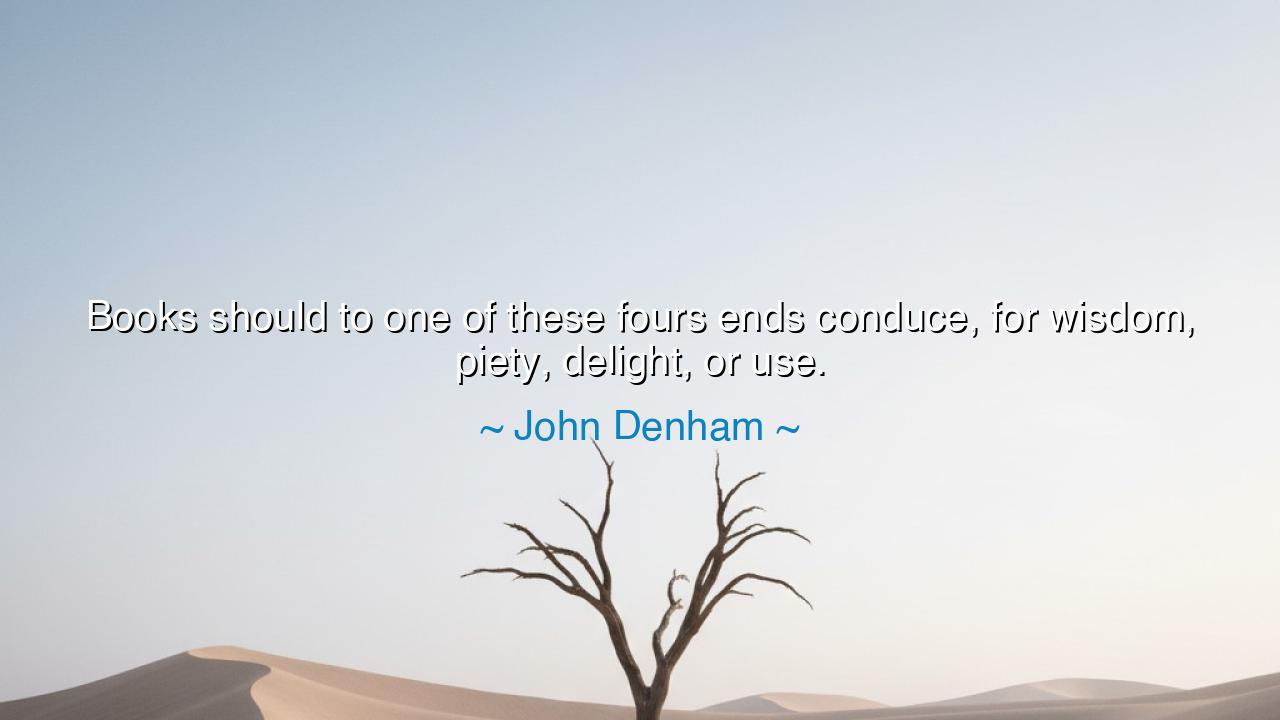
Books should to one of these fours ends conduce, for wisdom






Hearken, children of the ages, to the venerable words of John Denham, who proclaimed: “Books should to one of these fours ends conduce, for wisdom, piety, delight, or use.” In these words lies the eternal truth of literature, purpose, and the cultivation of the soul. Denham reminds us that the written word is sacred not merely as ornament, but as instrument, designed to enlighten the mind, elevate the spirit, bring joy, or serve practical ends in the affairs of life.
Denham teaches that reading must be purposeful. A book should stir understanding, awaken moral consciousness, or cultivate skill, lest it be an idle indulgence of the eyes alone. Wisdom emerges when knowledge is absorbed and reflected upon; piety flourishes when the soul is drawn toward virtue; delight enlivens the heart; and practical use equips the reader to act with competence and discernment. Each text carries the potential to enrich life in mind, spirit, or deed.
Consider the life of Benjamin Franklin, whose voracious reading spanned philosophy, science, and poetry. Each book he consumed served one of Denham’s ends: some nurtured his wisdom, guiding his inventions and political insights; some inspired his devotion and ethics; some delighted him in literature and wit; and some imparted practical skill, enabling him to shape the fledgling nation. Franklin’s life exemplifies the balance of reading for purpose, demonstrating the enduring power of books to serve multiple ends.
The ancients themselves revered the text as a vessel of knowledge and moral formation. From the scrolls of Plato to the sutras of the East, they taught that writings should cultivate the mind, spirit, or society. Denham’s reflection echoes this timeless understanding: books are not mere decoration, but instruments of instruction, reflection, and joy, capable of shaping the life and character of those who engage them with attention and reverence.
Thus, his counsel is both admonition and inspiration: let every text you encounter serve one of the noble ends—wisdom, piety, delight, or practical use. In doing so, reading becomes an act of cultivation, transforming both thought and heart, guiding the soul to virtue, and equipping the mind for action in the world.
Carry this teaching, children of generations yet unborn: approach every book with purpose, discernment, and reverence. Let it illuminate your understanding, inspire your spirit, bring pleasure to your heart, or equip your hands for noble deeds. In the careful engagement with written wisdom lies the enduring power of literature to shape lives, culture, and generations across the ages.






SHSu Huyen
I find this perspective deeply grounding. It suggests that the worth of a book lies in its capacity to elevate the reader—through understanding, virtue, joy, or practical wisdom. But I can’t help wondering how this applies to contemporary genres like fantasy or satire. Do they fit into these categories, or expand them? Maybe Denham’s four ends still hold true, but the ways books achieve them have evolved with time and culture.
DLDuong Lien
This statement feels like both a celebration and a filter for what makes a book worthwhile. It raises the question: should all literature strive for purpose, or is there beauty in writing that exists purely for art’s sake? Denham’s view is elegant but perhaps limiting by modern standards. Still, it’s refreshing to see reading described as a moral and intellectual act, rather than just a pastime or form of consumption.
HTHiep Tran
What strikes me here is how Denham organizes literature into moral and emotional functions. He seems to value books not just for information but for their influence on the reader’s spirit. But what about books that aim to provoke or challenge rather than delight or instruct? Could they also serve wisdom indirectly by forcing us to question our beliefs? Maybe the definition of ‘use’ extends to stirring critical thought, not just practical benefit.
QTQuan Ta
This quote makes me think about how modern reading habits have shifted. Today, so many books are written for profit or distraction rather than for wisdom or virtue. Have we lost sight of these higher purposes? I’m curious whether Denham meant these four ends as distinct categories or as overlapping paths toward human growth. It feels like a timeless reminder that reading should nourish more than curiosity—it should also refine character.
NNNguyen Nhi
I really appreciate the simplicity and balance in this statement. It captures how books serve both the mind and the soul. But I wonder—can a single book fulfill all four purposes at once? Some novels teach wisdom through delight, while others inspire piety or offer practical guidance. Maybe Denham is defining an ideal for writers as much as for readers: that literature should always aim to enrich, never just to entertain.